Poverty, Destitution, Hunger and Homelessness in the Midst of Plenty
This is nothing, but a manifestation of a cruel and inhumane state of affairs
‘A swathe of public opinion has turned cruel. ‘They just don’t give a shit,’ a woman who’s been living on the streets told me.’-John Harris
'A different world cannot be built by indifferent people.'
“To ignore evil is to become an accomplice to it”- Martin Luther King
“The only thing necessary for the triumph of evil is for good men to do nothing”- Edmund Burke
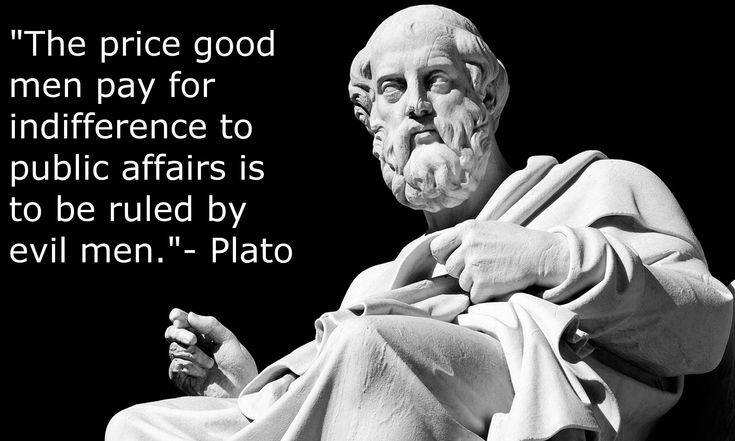
Photo:pintereset.com
‘Using austerity as a cloak, the Westminster Government has overturned any lingering notion of the common good, national solidarity or ethical based politics...The relationship between our politics, our ethics and our public life remain at the heart of this inequality and poverty story.’ -Poverty amid plenty
UK austerity has inflicted 'great misery' on citizens, UN says
‘The UK government has inflicted “great misery” on its people with “punitive, mean-spirited, and often callous” austerity policies driven by a political desire to undertake social re-engineering rather than economic necessity, the United Nations poverty envoy has found…
‘About 14 million people, a fifth of the population, live in poverty and 1.5 million are destitute, being unable to afford basic essentials, he said, citing figures from the Institute for Fiscal Studies and the Joseph Rowntree Foundation. He highlighted predictions that child poverty could rise by 7 percentage points between 2015 and 2022, possibly up to a rate of 40%...’ Continue to read
The Shame of Poverty and Destitution in Britain Today
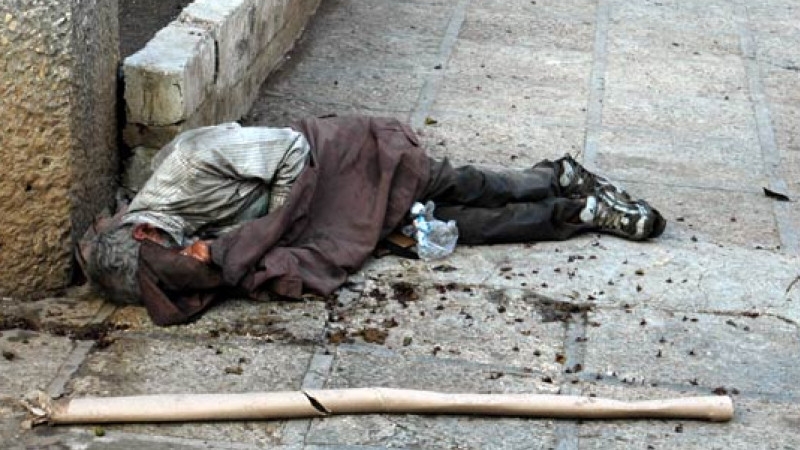
Photo:holyrood.com
And there are more children in extreme poverty and destitution
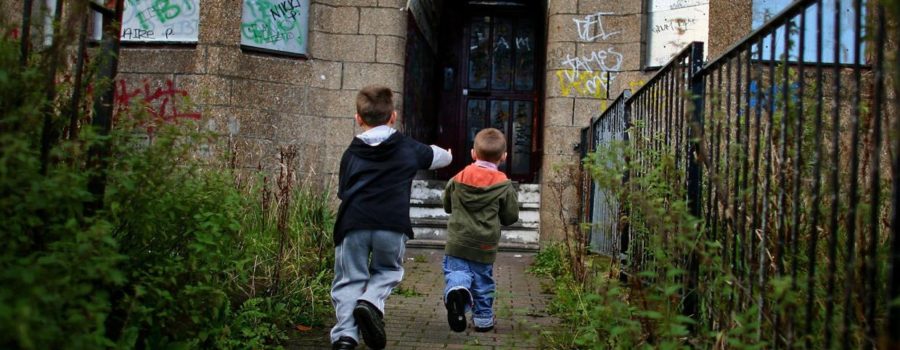
Over 300,000 children in abject poverty, destitute and hungry in affluent Britain today
Photo:independent.co.uk
‘As a wealthy country, why are we allowing this to happen? Where is the anger?’
Lest We Forget:
A country/nation drunk on market values, guided by cruel machinery of exploitation, racism, class division, austerity, cruelty, aggression, that humiliates it’s innocent, weak and vulnerable citizens, with neoliberalism, poverty, inequality and food banks and celebrates extreme individualism, feral competition, worship of mammon, rat-race to a success that it can never deliver and ignores the struggles and plight of its children and youth, ceases to be civilised and sooner or later ceases to exist morally or spiritually.
Today, I was reading a poignant and telling article about poverty, hopelessness, helplessness, homelessness, austerity and Brexit, in today’s populist Britain. The author was wondering why we have become so indifferent to pain, misery, struggles and the plight of those who have become the tragic victims of the neolibral, values-less, humane-less capitalism, which I very much wish to share with a wider readership.
However, to my mind, it will be very helpful, indeed, useful, if we can first and foremost, focus our minds, on the following questions. I am certain, having done so, the said article, becomes more relevant and more meaningful.
Turning a Blind Eye, or Having an Eye for Truth, Justice and Duty of Care for the Common Good? This is the Question!
These are some of the timeless questions, questions of meaning and value:
Where has our sense of responsibility gone? Where has our sense of moral compass gone? Where has our sense of neighbourly love gone? Where has our sense of historical understanding and sensibility gone? Where has our vision of what it means to be human gone? Where has our hope for a better world gone? Where has our understanding of for the common good gone?
All in all, we are living in times of profound turbulence, uncertainty and transition, where our ways of working, relating to each other and to mother nature, communicating and governing are quickly transforming. Many of our received wisdoms, habits and perspectives are becoming obsolete. What will emerge in the vacuum created by this disruption is not yet clear, the path is not bright yet, but some critical questions hang in the balance:
Will we manage to avert ecological, socioeconomic, political and spiritual crises? Will our new technologies enable powerful collaboration, or create intense polarisation and dehumanisation? Will we become, once again, the gatekeeper of the human soul?
The common good—the idea that our self-interests are always bound in some way to the interests of others—takes on a new dimension, meaning and urgency in the age of failing globalisation, and the rise of extreme poverty, inequality, fear, racism, cruel austerity and populism.
Blame the scroungers. Blame the migrants. How Britain fell for austerity
By John Harris, Via The Guardian
‘Homelessness is a neon sign that something is fundamentally wrong’
‘Nothing is a better reminder of inequality and human suffering than a rough sleeper.’
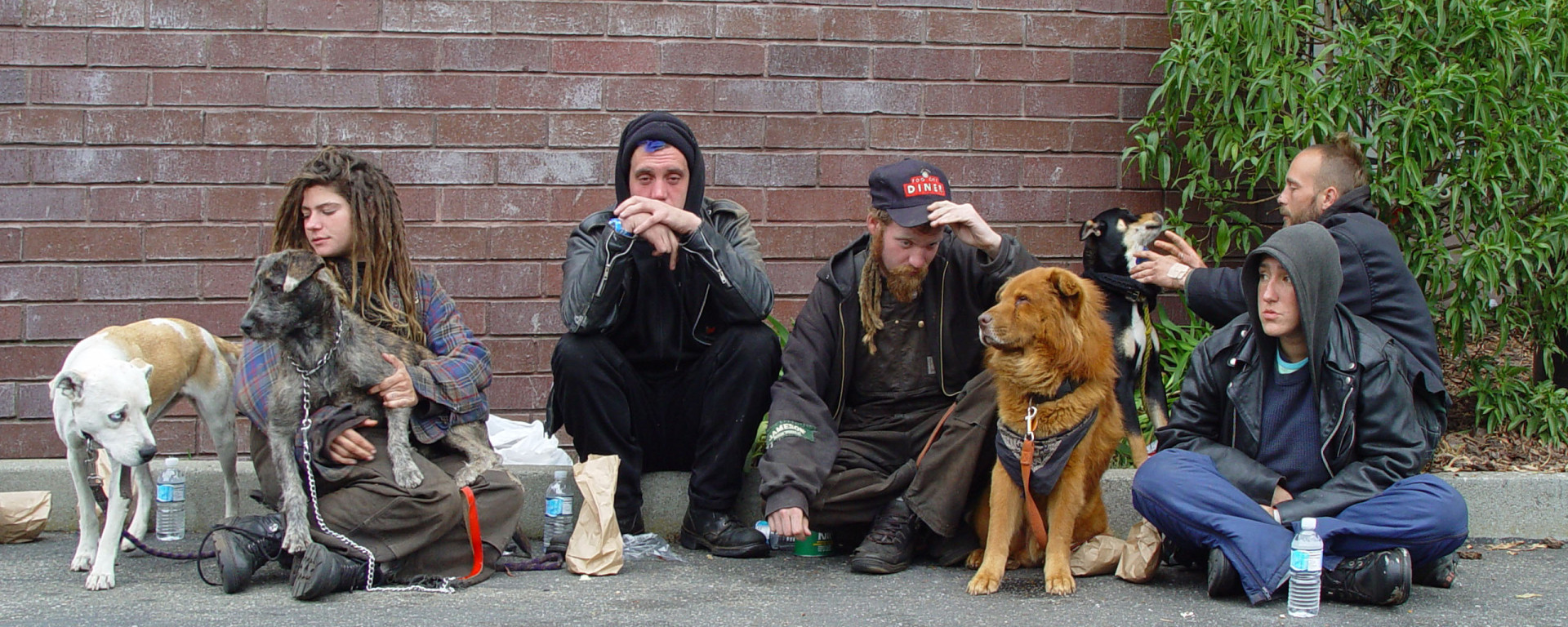
Photo:countrysquire.co.uk
See also: There is no excuse for homelessness in Britain in 2018
‘In January this year, I went on a Brexit trip to Dover. The main aim was to get a sense of what a no-deal exit from the EU would mean for the haulage trade, but while I was there I spent a long and cold afternoon wandering the seafront and town centre. Just near the white cliffs, on a jetty that seemed to form the last British land before the Channel, there was a dome tent, seemingly the property of someone who was homeless: an awful symbol of this country as a land of want and wilful neglect.
Later, in the centre of town, I met a woman who had been living on the streets for four years, having been repeatedly “sanctioned” and had her benefits stopped. The last time this had happened, she had been in hospital and failed to make it to the jobcentre, which caused her payments to be suspended for three months.
“You’ve got people here sleeping on the seafront, in huts, on the beach,” she said. “It’s disgusting.”
I was there, I told her, because of Brexit. “What is Brexit?” she asked. This was a sincere question. After a long pause, I told her that it meant our exit from the EU – which was proving to be long and complicated, meaning that politicians had little time to think of anything else, and the predicament of people like her was being forgotten.
“OK, yeah,” she said. “So basically they don’t give a shit.” This seemed like fair comment; we chatted for 10 minutes more, I gave her money to buy some food, and we went our separate ways. Over the past three years, incidents such as these have punctuated all my reporting: small, sobering encounters with good people whose day-to-day experiences place them at the social edges, far away from the cacophony of chatter about customs unions, backstops and trade agreements. I have met single fathers in small West Country towns forced to get help from local churches; people in the West Midlands who, relocated by London councils after becoming homeless, now find themselves without friends, family or the most basic support networks; others laid low by cuts to social care, public transport or special needs education.
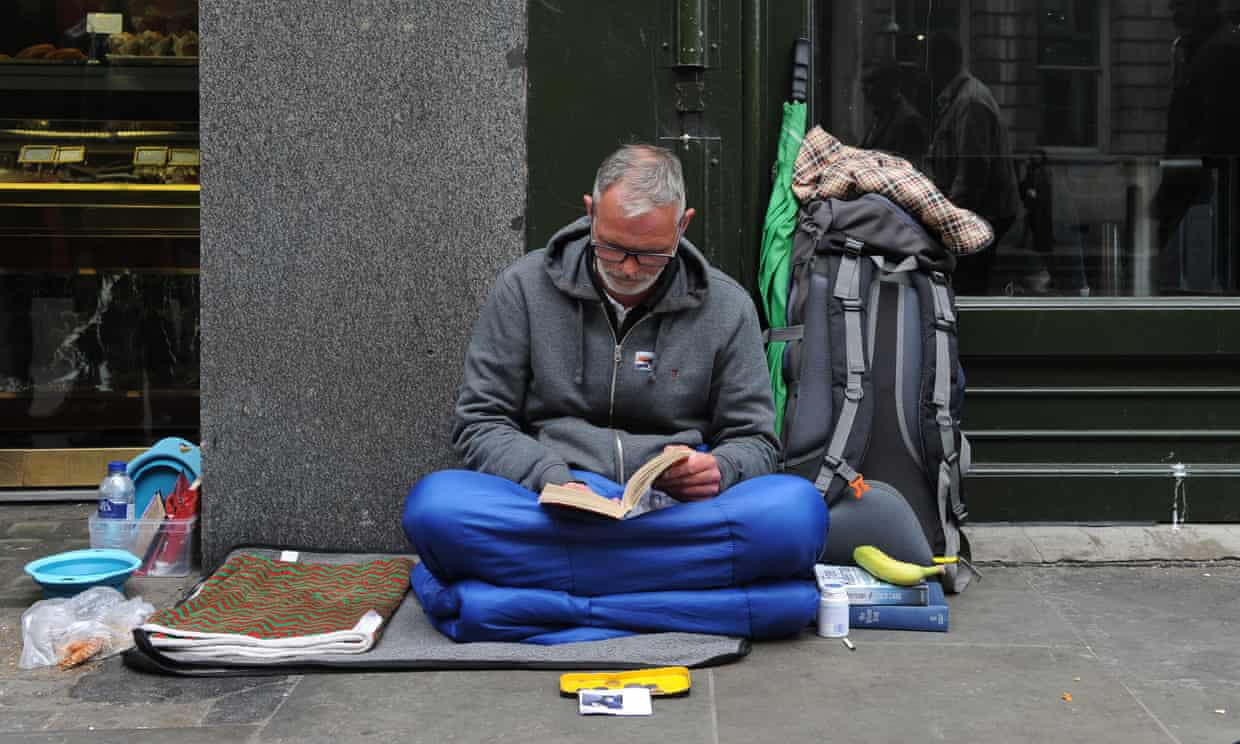
A homeless man in central London, one of the most affluent cities on earth
Photo: Don’t Demonise Beggars. It Won’t Solve The Problem Of Homelessness
‘In Eighteenth Century Great Britain, half the population lived in poverty. They survived, if they did, with disease, famine, illiteracy, lack of sanitation and in slums. It was normal then. Things had always been that way. They thought the poor, starving and ignorant mass of people would always be among them.’ Nothing, it seems, has changed much. The ‘Posh boys’ neoliberals still think this way: Tories 'don't care about the poor or NHS', Johnson adviser admits
Some of them have had views on Brexit just as strong as anyone else’s. But others have understandably treated all the Westminster drama and Brussels negotiations as a completely irrelevant, borderline-absurd business that says nothing to them about their lives. Remember: nearly 30% of us did not vote at all in 2016. That sense of pained indifference lingers on.
Now, as Brexit reaches its supposed climax, another too often unreported world is all around us: 50,000 children being fed by local schools over the summer holidays; parents who are skipping meals to try to save their kids from hunger; weekly stories about the endless nightmares of universal credit. In even the most outwardly affluent towns, I now expect to see sleeping bags in the doorways of empty shops, and people asking for spare change. Meanwhile, we are encouraged to stare at a mad parade of Tory politicians convinced that this blighted, almost broken, country is in need of yet another unprecedented economic shock. Their new leader’s antics have a flavour of pre-revolutionary France. To hell with poverty: here is Mr Optimism with a chicken, or in his new “Prime Minister”-labelled coat, or arguing with his girlfriend about a spilled glass of wine.
Which brings us to one of 2019’s most overlooked questions: how can the mad politics of Brexit, the camp theatrics of the new prime minister and the constant sense of social breakdown possibly coexist? Worse still, how can the political party responsible seemingly be in with a very strong chance of winning an election reckoned to be just around the corner?
Britain today and the Bankruptcy of Ideas, Vision and Values-less Education
To some extent, Tory Brexiteers have pulled off the most devilish kind of trick, sowing discord and resentment via austerity, presenting Brexit as some kind of answer and reaping the rewards. In this reading, however irrational it may seem, much of the enduring support for leaving the European Union – up to and including the no-deal version – is a misplaced reaction to poverty, inequality and cuts.
The Disintegration of this Disunited Kingdom- Canon Dr Paul Oestreicher
I have been to plenty of places – Wigan, Merthyr Tydfil, Stoke-on-Trent – where this rings true, and people do talk about voting leave as a reaction to years of economic neglect. But it is not the whole story, foundering when it comes to why millions of people in comparatively affluent places voted leave. And herein, perhaps, lies something too often overlooked: that in many cases support for austerity and Brexit are one and the same thing – proof that, with the Tories’ encouragement, a whole swathe of public opinion has long since turned cruel and inward-looking, and it will take a hell of a shock to push it somewhere else.
Recession, Austerity, Mental, Emotional and Physical Illness
In a recent book ostensibly focused on Jeremy Corbyn’s Labour party, but partly about recent British political history, the academics Matt Bolton and Frederick Harry Pitts explain the last decade in terms of “austerity populism”. Cuts, welfare crackdowns and the case for leave, they explain, were all sold to the public via the exclusion of supposedly unproductive undesirables: “scroungers” in the austerity narrative; “migrants” in the stories that swirled around the 2016 referendum.
Both traded on a nostalgic idea of national struggle, keeping calm and carrying on, and some strange, latent belief that the country was in need of a purgative spell of pain akin to an imaginary version of the second world war. In this vision, David Cameron’s election victory in 2015 and the leave side’s win a year later were watershed moments on the same national journey.
The scar on the conscience of Britain: The neglect of its children, youth, students and more
But if austerity populism has so far been politically successful, it also comes with obvious risks. Trumpeting the wonders of slashing services and kicking around the poor only works for as long as the majority of people are largely untouched by those things – which is why Johnson is now partly changing tack and pledging to spend money (although our nasty, broken benefits system and countless imperilled public services will surely remain untouched).
By the same token, the romance of leaving the EU will only endure while its losers – sheep farmers, car industry workers, people who have come to the UK from central and eastern Europe – form a minority, and enough voters can still be persuaded that they will be winners in a Tory Brexit. Yet, however shambolic the opposition offered by Labour, the lived reality of no deal would surely risk tipping too many people into doubt and fear and away from the Conservatives, which is one reason why Johnson and his allies are in such an obvious hurry.
The emotional side of me would simply describe this all as a very English tragedy, centred on a mean-spiritedness that the woman I met in Dover would instantly recognise. And at least until the end of this long, overheated summer and the start of an autumn of nightmares, millions of us will carry on behaving much as we have done for the last decade: not just passing by on the other side, but dancing as we do it.’-See the original article here
And Now the Good News: Yes, There are Alternatives to This Madness, This Continuing Tragedy
T.S. Eliot posed the question: "Where is the Life we have lost in living? Where is the wisdom we have lost in knowledge? Where is the knowledge we have lost in information?"
Despite the major technological and scientific advances, the billions invested in AI and all the hype around other forms of technologies, we still are not able, as it seems, to answer fundamental questions, such as those posed by Eliot; so that we may rise to the challenges of our time, and be guided by our collective wisdom and intelligence, when thinking about how to solve some of society’s biggest problems and issues.
In the link below, guided and inspired by the wisdom and insights of many observers, we can see the light of hope, that, indeed, there is a key that will unlock the door to a better life. Let’s come together and unlock it jointly:

Photo:virtuesforlife.com
‘The pertinent question at this time of crisis must surely be: When and how on earth are we, the people, the citizens, going to rise and challenge the underlying causes of crisis by saying enough is enough. I am not going to be fooled anymore. I am going to challenge the system and the so-called leaders that for so long have abused me, lied to me, cheated me, humiliated me and have brought me such a bitter harvest.’
The Age Of Perpetual Crisis: What are we to do in a world seemingly spinning out of our control?
